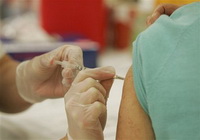Americans Question Safety of Swine Flu Vaccine
According to a Consumer Reports poll conducted in September, many Americans confess that they are unsure about receiving the swine flu vaccine. The poll found that 43 percent of Americans were undecided about getting the vaccine this season and only 34 percent said they definitely would get the vaccination if it were available to them.

Parents were also unsure about vaccinating their children. About 35 percent said they would definitely vaccinate their child for H1N1 this season and 50 percent said "it depends."
The newness of the vaccine has remained an issue for many of these parents.
However, local and state health officials continue to reassure that the vaccine is the best prevention against the H1N1 virus.
Dr. Michael Bohlin, Tippecanoe County health officer, said the vaccine is safe because it was manufactured the same way as the seasonal flu vaccine. He said this manufacturing process has been thoroughly tested, Journal and Courier reports.
Meanwhile, it was reported, that no vaccine is 100% safe for everyone. People with allergies to eggs, for example, can't take flu vaccines because eggs are involved in the manufacturing process.
And flu vaccines cause mild but common reactions. About one in three people get a sore arm from the shot, some with a little redness or even swelling. Some 10% to 15% of people feel tired or get a headache; some may even run a low fever.
Approved vaccines -- including the 2009 H1N1 swine flu vaccine -- are calculated to be much, much less risky than the diseases they prevent. For example, out of every million people who get a flu shot, one or two will get a serious neurological reaction called Guillain-Barre syndrome (GBS).
In clinical trials, 10,000 to 15,000 children and adults have received various manufacturers' brands of H1N1 swine flu vaccine. Nothing serious happened to any of them, including this reporter, who received a double dose of the Sanofi-Pasteur swine flu vaccine, WebMD reports.
In the meantime, Fairfax County has canceled two mass swine flu vaccine distributions after the Washington region's most populous locality was told it would receive only a fraction of the vaccine doses it had expected.
"Certainly the ideal would have been to have enough vaccine to be available for everyone," said Gloria Addo-Ayensu, Fairfax County's health director. "We won't have as many as anticipated but we do know who our highest target priority groups are and that's who we are focusing on. Certainly not everyone who should come down with H1N1 will be severely ill."
Vaccine is still being produced and is expected to be available in the coming weeks, Addo-Ayensu said.
But the vaccine shortage comes at a time when the spread of the H1N1 flu virus to children and teenagers has been especially acute. Earlier this month, health officials announced that 19 children nationwide had died from flu strain in a single week. Most of those children had health problems that made them vulnerable but roughly 20 to 30 percent of those who have died from the virus this flu season were otherwise healthy, officials said. As of Oct. 14, about 265,000 H1N flu vaccine doses have been shipped to Virginia, The Washington Post reports.
Subscribe to Pravda.Ru Telegram channel, Facebook, RSS!


